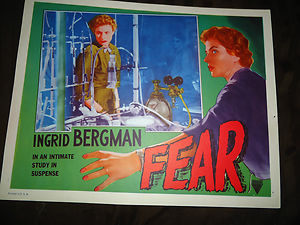
FEAR
Italy, 1954, 84 minutes, Black and white.
Ingrid Bergman, Matthias Wieman.
Directed by Roberto Rossellini.
Fear is one of several films made by Roberto Rossellini during his marriage to Ingrid Bergman. They met when he invited her to Italy to perform in Stromboli in 1949. She stayed in Italy for another six years, the victim of a media attack, especially in the United States. While in Italy she made a number of films for Rossellini including Europa 52, Journey to Italy and this one.
The film was based on a novel by Stefan Weig (Letter to an Unknown Woman) and his novel Angst. The film is about an adulterous woman – and the film has interest insofar as Rossellini and Bergman are dramatising something of their own experience. The film focuses on the woman, in a dark landscape, she informs the audience about her relationship and shows her story in flashback. There is something of a happy or at least peaceful ending.
Ingrid Bergman had made her mark in Sweden in the 1930s, was brought to the United States for a remake of Intermezzo and began a strong Hollywood career which included an Oscar for Gaslight in 1944. After her return to America from Italy she was received well and received another Oscar for Anastasia in 1956. She received a third Oscar as best supporting actress for Murder on the Orient Express in 1974.
Rossellini continued to make a number of films, some very serious explorations of historical and literary characters for Italian television. He also made a Jesus film in 1971, The Messiah.
1. How interesting a film, psychological drama, moral fable? Impact in the 50s, now?
2. The work of Roberto Rossellini, especially with Ingrid Bergman?
3. Black and white photography? Co-production with German-based story with Italian treatment? Semi-classical score?
The themes and their treatment in the 50's, now? The basis of the story in the emotion of fear - as illustrated in each of the major characters? The initial story was called Angst: the particular emphasis of this word? Its hold on people, deeper than mere surface emotions? The consequences of this kind of fear - manipulative, destructive?
4. The atmosphere of post war Germany? its transition to the modern era, the memories of the war, concentration camps and imprisonment, the new factories, experiments in science, medicine? An atmosphere of transition - a cure for ills and fears?
5. The introduction to Irene - and the presentation of Ingrid Bergman and the film's continued focus of her? Her driving and her moods? The impulsive farewell to Eric and the breaking off of the affairs, indications of fear? The basis for her decision? Her love for Eric? The emotion of the scene, the effect of the separation on each of them? The scene portrayed in light and shadow as a sign of the scenes to come?
6. The contrast with Irene and her husband? Her arrival home and his studious work, her lies and hedging, how was tension created? The atmosphere of deceit, the quality of their talk together? Her love for her husband and yet her fear? How different a woman was she at work? Her presence with the experiments, her work in her office? Business phone calls, the anxious calls to Eric? Her ability to cope and her growing inability? The fact of her children being in the country with the nurse?
7. The change of atmosphere with the visit to the country, the fishing, the playing with the children, her friendship with the nurse? Possible peace - what did she hope for?
8. The presence of the blackmailing woman - her point of view, her feelings, the money and the demands? Her presence, her phone calls? The effect on her and her husband, ironic comments on this - with our later knowledge how sinister did they seem? The pressures on Irene, her trying to borrow the money from her servants, from her husband? The presence in the theatre , the incident with the ring and Irene's lies? Her growing desperation?
9. The complications of Irene’s life and tactics, deceiving her husband, anxious phone calls, the changing plans because of the theatre?
10. What caused the blackmailing woman to change her attitude? Her genuine love for Eric and her despising of him as a person? Her jealousy? The ironic truth when he told Irene what had happened - and the ominous presence of the husband outside the restaurant? The compassion on the part of the woman?
11. The sinister view of the husband's behaviour when the truth was revealed? The scene with his persuading the woman about her tactics? A seemingly good man turning evil?
12. The contrast with Eric as an ineffectual person, a fascination for Irene, the emotional complications?
13. The effect of the revelation on Irene and its shattering her? How convincing was her contemplation of death? How was this revealed in the phone call to the nurse and her concern about the children, her driving to the laboratory, the poison and our previous knowledge of what it could do? The suspense and the build-up as she moved towards suicide?
14. The irony of her being saved by her husband? How melodramatic was the split second in which she was saved?
15. How convincing was the reconciliation? Two people deceiving one another - the comparison of their deceptions? Who hurt the most? whose sin and lie was more evil? A basis for reconciliation?
16. How convincing a psychological and emotional study of relationships, love and hate? How true to human experience?